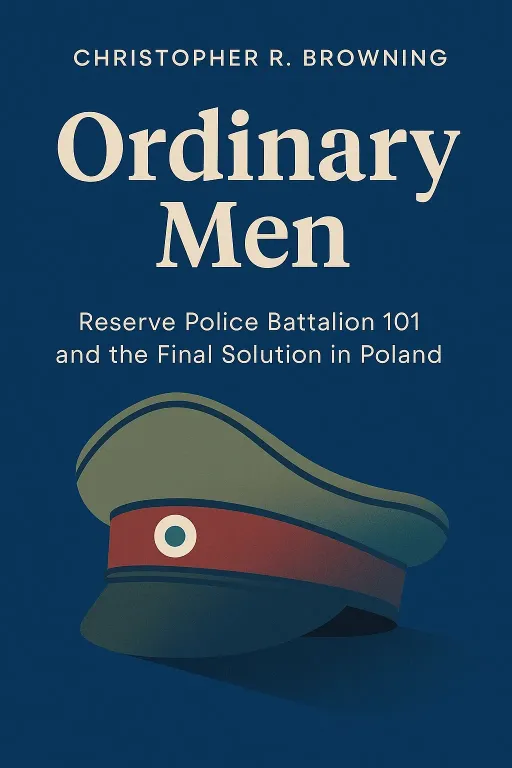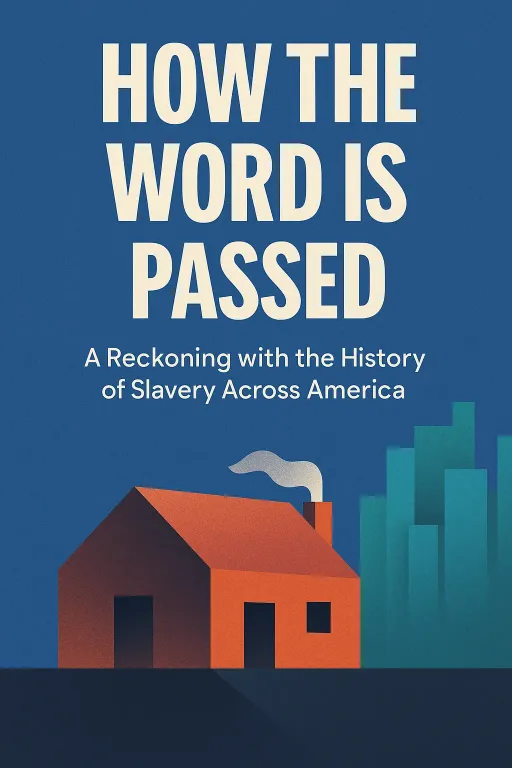
Ordinary Men
10 minReserve Police Battalion 101 and the Final Solution in Poland
Introduction
Narrator: On the morning of July 13, 1942, the men of a German police unit were assembled in the Polish village of Józefów. They were not elite SS soldiers or hardened ideologues; they were middle-aged reservists, family men from Hamburg, drafted into service. Their commander, Major Wilhelm Trapp, a 53-year-old career policeman, addressed them with tears in his eyes and his voice choking. He explained their horrific task: they were to round up the 1,800 Jews of the village, separate the able-bodied men for labor, and shoot the rest—the women, the children, and the elderly. Then, he made an extraordinary offer. If any of the older men did not feel up to the task, they could step out without consequence. Faced with a direct order to commit mass murder, yet given a clear choice to refuse, what did these ordinary men do? This disturbing question lies at the heart of Christopher R. Browning’s groundbreaking historical study, Ordinary Men: Reserve Police Battalion 101 and the Final Solution in Poland, which meticulously reconstructs the battalion's path from civilian life to mass murder.
The First Test - A Choice in Józefów
Key Insight 1
Narrator: The massacre at Józefów served as the battalion's brutal initiation into the Final Solution, and more importantly, as a crucial test of individual will. When Major Trapp, visibly distressed, presented the orders, he framed them as a regrettable necessity from the "highest authorities." He attempted to justify the killing by mentioning Allied bombing in Germany, a weak rationalization for the slaughter of civilians. His offer for the older men to abstain was unprecedented. In a regime built on absolute obedience, this was a moment of genuine choice.
Initially, only one man, Otto-Julius Schimke, stepped forward. After being berated by his captain, Major Trapp intervened to protect him. Eventually, about a dozen more men followed suit. The vast majority, however, did not. They proceeded with the roundup and the executions. The killing was chaotic and gruesome. The policemen, inexperienced with such a task, used carbines that often failed to kill with a single shot, inflicting terrible wounds and immense suffering. The psychological toll was immediate. Men asked to be relieved, feigned clumsiness, or simply shot poorly. By the end of the day, 1,500 Jews were dead. The men returned to their barracks shaken, drinking heavily to numb the experience. The Józefów massacre established a critical precedent: when given a clear opportunity to refuse participation in mass murder without formal punishment, the overwhelming majority of ordinary men chose to kill.
The Normalization of Atrocity
Key Insight 2
Narrator: Following the psychological trauma of Józefów, the battalion's methods evolved to make the killing more efficient and less personal. This descent into normalized brutality is starkly illustrated by the massacre at Łomazy just one month later. For this operation, the battalion was joined by a unit of "Hiwis"—Soviet prisoners of war recruited as auxiliaries and trained at the Trawniki camp.
The division of labor was critical. The German policemen were primarily responsible for the roundup, while the Hiwis, plied with large amounts of vodka, were assigned the role of primary shooters. This arrangement created a psychological buffer for the Germans. They could participate in the overall operation without having to look their victims in the eye as they pulled the trigger. The process became more depersonalized and assembly-line-like. Unlike at Józefów, there was no explicit offer to opt out. The leadership of officers like the sadistic Lieutenant Gnade, who beat elderly Jews for sport, fostered an environment where brutality was expected. The use of Hiwis and the consumption of alcohol allowed the German policemen to become more callous, transforming an act of mass murder from a traumatic personal crisis into a routine, albeit unpleasant, task.
From Shooters to Shippers - The Role in Deportation
Key Insight 3
Narrator: As the Final Solution industrialized, the role of Reserve Police Battalion 101 expanded from direct killing to facilitating mass murder on a grander scale. The men became integral cogs in the machinery of deportation, clearing ghettos and guarding the trains that sent tens of thousands of Jews to the gas chambers of Treblinka. The deportation from the Międzyrzec ghetto in late August 1942 reveals the exceptional brutality of this phase.
Międzyrzec was a massive transit ghetto, and the battalion was tasked with clearing it of nearly 11,000 Jews. The operation was marked by unimaginable ferocity. Drunk Hiwis and German police whipped and beat people toward the train station, shooting anyone who faltered. The process of loading the cattle cars was a scene of chaos, with policemen firing into the packed cars to force more people inside. The ratio of on-the-spot killings to deportations was nearly 9 percent, a figure that shocked even the increasingly numbed policemen. In a bizarre and telling detail, Captain Wohlauf brought his pregnant wife to witness the action, an act his men saw as a grotesque display of pretension. Their outrage was not directed at the massacre itself, but at the impropriety of having a German woman present. This moment exposed their lingering, albeit warped, sense of shame, revealing a deep psychological conflict even as they participated in the atrocity.
The Final Hunt and the Harvest Festival
Key Insight 4
Narrator: By the fall of 1942, after the major ghettos had been liquidated, the battalion's mission entered its final, most intimate phase: the "Jew hunt." This involved systematically tracking down and killing the thousands of Jews who had escaped into the forests and were hiding in makeshift bunkers. This was not anonymous, assembly-line killing; it was a face-to-face pursuit where small patrols hunted families. This daily routine of murder became, in the cynical words of the policemen, their "daily bread."
The battalion's bloody service culminated in November 1943 with their participation in "Aktion Erntefest," or "Harvest Festival." This was the single largest German killing operation against Jews in the entire war, a two-day massacre designed to eliminate the last remaining Jewish labor camps in the Lublin district. The men of Battalion 101 helped guard the routes and killing sites at Majdanek and Poniatowa, where over 42,000 Jews were shot in trenches. They were direct witnesses to an industrialized process of slaughter, with music blaring from loudspeakers to drown out the screams and gunfire. This final act cemented the battalion's role as comprehensive perpetrators, involved in every facet of the Final Solution from individual shootings to the largest massacres.
The Power of Conformity Over Conviction
Key Insight 5
Narrator: Why did these ordinary men become killers? Christopher Browning argues against a single, simple explanation. While he acknowledges that latent anti-Semitism was a precondition—the men did not see Jews as part of their community of human obligation—he concludes it was not the primary driver. The men were not, for the most part, ideological fanatics who were eager to kill. Instead, Browning points to a powerful cocktail of situational forces.
The most significant factor was the immense pressure to conform. In the masculine, militarized environment of the battalion, the fear of being seen as "weak" or a "coward" by one's comrades was a more powerful motivator than abstract moral principles. Refusing to shoot meant separating oneself from the group and failing to do one's share of the dirty work, a burden that would then fall on a comrade. Compounding this was a deference to authority, where orders from the state were seen as legitimate, and the segmentation of tasks, which allowed individuals to distance themselves from the final outcome. Browning argues that for the men of Reserve Police Battalion 101, the choice was not between obeying or disobeying, but between killing and not killing. And for most, the price of not killing—social ostracism from their peers—was simply too high to pay.
Conclusion
Narrator: The single most important takeaway from Ordinary Men is that the capacity for extraordinary evil does not require extraordinary monsters. It can be unlocked in ordinary people when they are placed in extraordinary circumstances that exploit basic human frailties. The men of Reserve Police Battalion 101 were not pre-programmed killers; they were husbands, fathers, and workers who were brutalized, desensitized, and ultimately transformed by a system that leveraged peer pressure, obedience, and the dehumanization of its victims.
The book’s most challenging idea is its universality. It forces us to look away from the comfortable notion that the perpetrators of the Holocaust were a uniquely evil breed and instead confront the unsettling possibility that the potential for such behavior lies dormant within modern society and human nature itself. It leaves us with a sobering question: In the face of immense social pressure to conform to an immoral act, would we have the courage to be the one who steps out?









